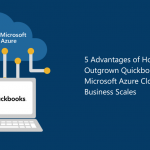
Azure Security refers to security tools and capabilities available on Microsoft’s Azure cloud. Microsoft Azure provides confidentiality, integrity, and availability of customer data. This powerful combination helps protect your applications and data. Azure confidential computing allows you to take the security of your applications to the next level by protecting data while being processed.
Protect data, apps, and infrastructure quickly with built-in security services in Azure. Also, gain from the state-of-art security delivered in Azure data centers globally.
Some of Azure’s main security services include:
Threat Detection
Your business may depend on avoiding data breaches. That is why Azure validates that data is not inadvertently exposed to unauthorized users. This makes it more difficult for hackers to gain or use credentials.
Azure cloud delivers workload protection and threat hunting to enterprises as they build their cloud environments. In addition, it assesses workloads and raises threat prevention recommendations. This hybrid cloud approach greatly simplifies the discovery and assessment of security threats. As a result, businesses can understand what’s needed and in many cases get a fix at the click of a button.
Continuous Monitoring
Security is about managing the access of users to the organization’s applications. In Microsoft Azure, this is truer than ever before. As the platform provider, Microsoft promotes rigorous standards for security maintenance.
The solution builds an efficient, adaptive, and continuously updated line of defense around your environment.
Azure Networking Security
Network security has been the traditional linchpin of enterprise security efforts. In Azure, security is built in at every step—design, code development, monitoring, and operation. Azure has advanced cloud-native solutions for protecting your applications, networks, and workloads.
You can use an Azure network security group to filter network traffic. The goal is to ensure that only legitimate traffic is allowed. Moreover, routing between subnets happens automatically, and you don’t need to manually configure routing tables. Consequently, you can integrate network security into your DevOps model to build your infrastructure in the cloud.
Azure and Intel Set to Transform Confidential Computing
Microsoft continues to secure all your data in Azure by delivering next generation confidential computing. Confidential computing is the protection of data-in-use through isolating computations to a hardware-based trusted execution environment (TEE). While data is traditionally encrypted at rest and in transit, confidential computing protects your data while it’s being processed.
According to Mark Russinovich, CTO of Microsoft Azure, Azure now has the widest stack of confidential computing options such as confidential virtual machines, confidential containers, confidential machine learning, confidential IoT edge devices, and soon confidential capabilities within Azure SQL.
Azure is one of the first to adopt the 3rd generation Intel® Xeon® Platform, code named Ice Lake. It includes “full memory encryption and accelerated cryptographic performance for confidential computing with Intel Software Guard Extensions (SGX).” This technology is now available, enabling even more confidential computing framework for Azure customers.
There is no doubt that Azure cloud provides unmatched cloud security. Its continuous evolution and transformation of being the most secure cloud is unmatched. Before all of this, you need a reliable partner to guide you through the process. At Technology Management Concepts, that is precisely what we do. Contact us to get started.





